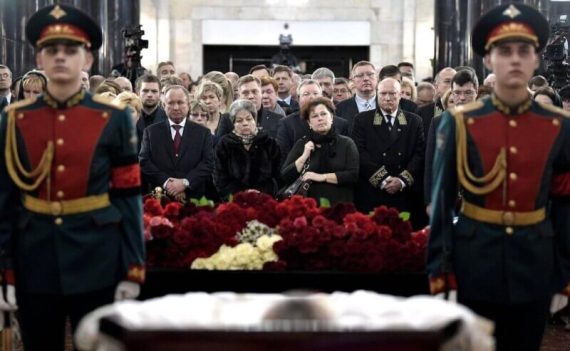R
ussian Ambassador to Turkey Andrei Karlov was assassinated by Mevlüt Mert Altıntaş, a police officer from the Ankara Police Department, during the opening of a photography exhibition at the Çağdaş Sanat Merkezi contemporary arts center in Ankara on December 19, 2016. After the assassination, Altıntaş, shouting slogans of the terrorist Salafist/jihadist Jabhat al-Nusra, engaged in a confrontation with police officers who came to arrest him and was fatally shot. These events took place in full view of visitors to the exhibition and the media.
At the time of the assassination, Aleppo had been retaken from opposition forces by the Syrian regime with the support of the Russian air force, sparking protests from certain conservative groups in Turkey. As a form of protest, several demonstrations were held in front of Russian diplomatic missions across Turkey.
In the aftermath of the assassination, Turkish intelligence and security forces launched a meticulous operation to uncover the plot, with the support of Russia’s internal security service, the FSB. Crucial clues to the incident were quickly obtained, shedding light on the underlying circumstances. The trial for the assassination was concluded on March 9, 2021.
Şahin Söğüt, an officer linked to the Gülenist terrorist organization (FETÖ) and associated with Altıntaş, and the defendants Salih Yilmaz and Ahmet Kılıçarslan, who were involved in giving the assassination order to Altıntaş, were sentenced to aggravated life imprisonment. Hüseyin Kötüce and Vehbi Kürşad Akalın, identified as members of FETÖ’s secret intelligence network and involved in the planning of the assassination, were also sentenced to aggravated life imprisonment.
Read: FETO’s Russian Roulette?
FETÖ is behind the assassination
At the end of the trial, it was definitively and irrefutably established that the assassination was orchestrated by FETÖ in order to strain relations between Turkey and Russia and potentially instigate armed conflict. Another important motive behind the attack was to falsely portray Turkey as having links with Salafi/jihadist terrorist groups. In this context, FETÖ sought to present Turkey to the world as a nation incapable of protecting diplomatic missions and harboring Salafist/jihadist terrorists.
From an intelligence perspective, it is noteworthy that all the individuals convicted communicated with each other using messengers, payphones, and, occasionally, disposable mobile phones registered under false identities. This is compelling evidence that they sought to conceal their links. The case further revealed that Altıntaş on the instructions of FETÖ deliberately made contact with various radical Salafist groups in Turkey before the assassination.
Altıntaş even attended radical Salafists’ meetings for a period of time. By so doing, he attempted to conceal his association with FETÖ and to present himself as a person who was aligned with radical/Salafist extremist ideologies. In the course of the assassination, he loudly chanted slogans in support of Jabhat al-Nusra in an attempt to create the impression in Turkey and around the world that radical groups in Syria were responsible for the attack.
“Temel Alsancak”
For those unfamiliar with intelligence operations and strategies, this may seem confusing or difficult to understand. However, those aware of such operations understand that Altıntaş carried out a “false flag” operation, which is a well-established technique in intelligence operations.
Temel Alsancak, known by the codename “Kadir,” the alleged mastermind of the Karlov assassination, has been located in Texas, U.S. Alsancak, who enjoys a luxurious lifestyle, was found to have set up four different front companies to facilitate visa services for FETÖ members.
FETÖ members and leaders are known to live in the U.S. In the past, the Turkish media has reported on this issue, and Turkish intelligence and security circles have submitted their reports on the issue to the U.S. authorities.
The most important reason why this case took seven years to complete is the complex and secret nature of the network of people who planned and carried out the Karlov murder. It is also true that FETÖ members used many secret communication techniques to hide the fact that they were planning the murder. However, Turkish intelligence and security circles eventually managed to decipher this complex FETÖ network.
Recommended
Putin
In the aftermath of the assassination, Russian Federation President Vladimir Putin said the following at the end-of-year press conference in 2016: “It seems to me that everything is possible, and the infiltration of subversive elements into the state apparatus, including law enforcement agencies and the Turkish military, was very extensive.” At the same press conference, Putin added that Altıntaş was an example of “the manifestation of the infiltration of subversive forces.”
As Putin’s remarks make clear, FETÖ did not succeed in achieving its goal by killing Karlov. Following the incident, Turkish-Russian relations continued to develop in a balanced and mutually beneficial manner. Subsequently, thorough judicial and administrative investigations into FETÖ continued in Turkey, leading to the eradication of its influence in public institutions.
In addition, foreign operations by the National Intelligence Organization (MIT) to arrest prominent FETÖ figures gained momentum, resulting in the extradition of several key FETÖ figures to Turkey for prosecution.





